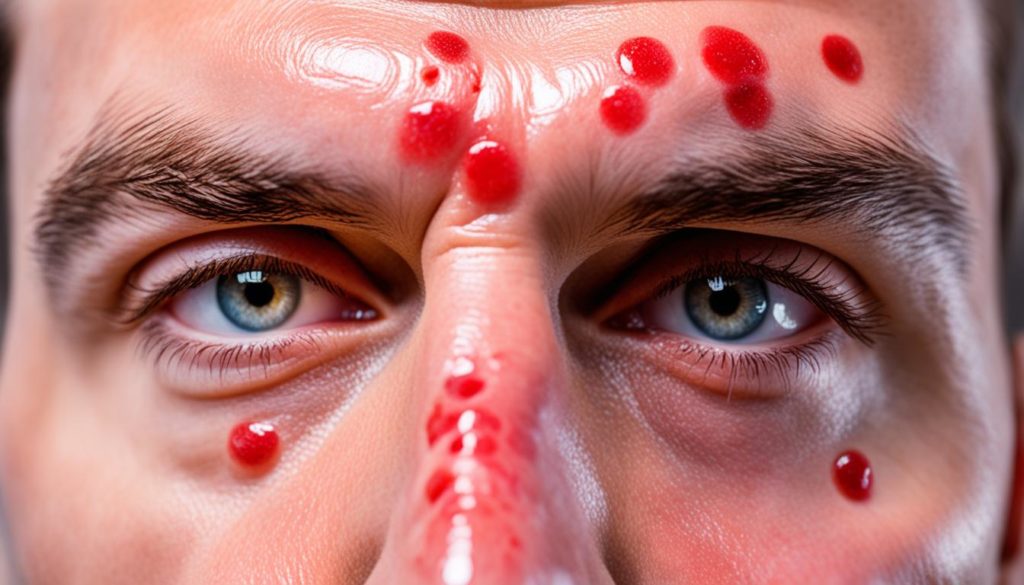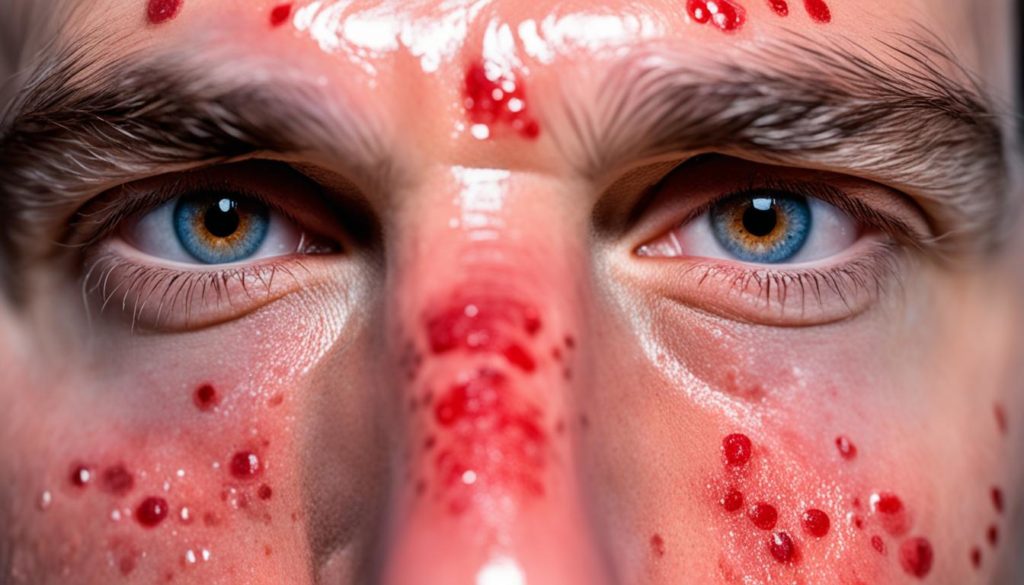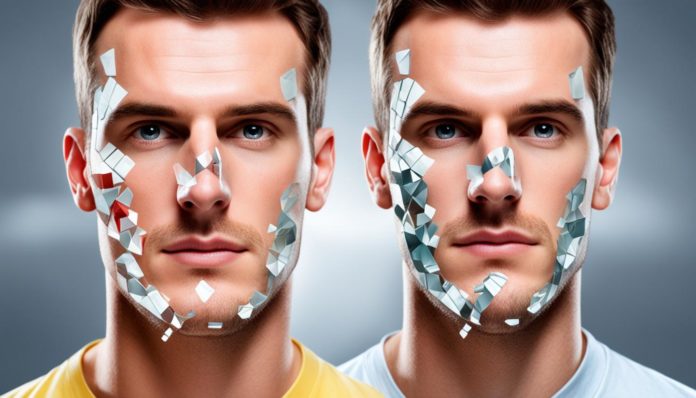Did you know nearly 40% of adult men battle with acne? It’s not just a teenage issue. Acne can hit men hard even as adults. This can mess with their confidence and day-to-day life. Getting to know the skin challenges men face helps in finding better treatments.
We’ve put together a guide to walk you through acne in men. We’ll cover what causes it, how to treat it, and ways to prevent it. Our goal is to clear up myths about men’s acne. We’ll share treatment tips and skincare advice. We want men to feel in charge of their skin and feel better about themselves.
In our guide, we’ll tackle each important part of dealing with acne in men. We’ll talk about hormones, genetics, and how lifestyle affects skin. We aim to give a full picture. This should help men make smart choices for their skin care.
Key Takeaways
- Acne affects nearly 40% of adult men.
- Acne in men can significantly impact self-esteem and quality of life.
- A comprehensive approach is necessary to address causes, treatments, and prevention.
- Understanding hormonal and genetic factors is crucial for effective men’s acne treatment.
- Lifestyle changes and proper skincare routines can greatly reduce acne incidence.
- Men’s skincare for acne requires personalized products and routines.
Understanding Acne in Men
Acne is a skin issue many men face. It’s important to know the reasons behind male acne. Things like hormones, lifestyle, and the environment affect its development. This part will explore the causes of male acne and how it differs from women’s.
What Causes Acne in Men?
Acne in men comes from hormonal imbalances, too much oil, clogged pores, and bacteria. Androgens can cause more oil, leading to acne. Diet, stress, and cleanliness also affect acne.

Difference Between Male and Female Acne
Men’s and women’s acne don’t look the same because their skin and hormones are different. Men’s skin is thicker and their oil glands are bigger. This can make their acne worse. Also, men’s hormone levels are more constant, unlike women’s, which change with their menstrual cycles. So, treating male acne needs a different approach.
| Factor | Male Acne | Female Acne |
|---|---|---|
| Hormonal influence | Consistent, driven by androgens | Cyclical, tied to menstrual cycles |
| Skin thickness | Thicker | Thinner |
| Oil production | Higher | Moderate |
Knowing these differences helps find the right treatments for men. This makes it easier to care for men’s skin effectively.
Hormonal Acne in Males
It’s important to know the details about hormonal imbalances to understand male acne. These imbalances, especially from androgens like testosterone, have a big impact. They can make acne worse or change how it looks.
Hormonal Imbalances Linked to Acne
Testosterone can make acne problems bigger when its levels go up. This makes the oil glands work more, making too much oil. Too much oil leads to clogged pores and starts acne.
For guys, hormonal acne is closely linked to when androgens spike, like during puberty. These times are when guys are more likely to get acne breakouts.

Signs and Symptoms of Hormonal Acne
To spot hormonal acne in guys, look for certain signs. It usually shows up on the jawline, chin, and neck. This kind of acne tends to be deeper and more painful. It’s different from other acne types.
Hormonal acne also comes and goes with hormone changes. Knowing these signs helps get better treatment sooner.
Common Male Acne Causes
Knowing the causes of male acne is crucial for prevention and treatment. We explore how diet, lifestyle, and genetics link to acne.
Diet and Lifestyle Factors
Diet has a big role in causing acne in men. High sugar foods and dairy often lead to more acne. These diet related acne triggers raise blood sugar and insulin, making more skin oils.
This can make pores clog. Stress and too much sweating also make acne worse. Stress increases hormones that make acne. Sweat mixes with oils and dirt, blocking pores. Eating better and managing stress can help prevent male acne causes.
Genetics and Acne
Genetics also matter in getting acne. If your family had bad acne, you might too. Genes affect oil glands and how your skin reacts to hormones.
Knowing your family’s acne story helps create a good skincare plan. Being aware of genetic acne factors helps choose the right treatments. This helps you manage your skin better.
Men’s Skincare for Acne
A good acne-fighting skincare routine is key for men who want to fight acne. It’s important to know which products to use and which to avoid for better skin health and clarity.
Effective Skincare Routines
Start with a gentle cleanser, such as Cetaphil Daily Facial Cleanser, to remove dirt and excess oil without irritating the skin. Next, use a salicylic acid toner like Paula’s Choice Skin Perfecting 2% BHA Liquid Exfoliant. This can unclog pores and lessen acne.
Then, add a lightweight moisturizer. Neutrogena Hydro Boost Water Gel is great because it keeps the skin hydrated without making it greasy.
- Cleansers: Cetaphil Daily Facial Cleanser
- Toners: Paula’s Choice Skin Perfecting 2% BHA Liquid Exfoliant
- Moisturizers: Neutrogena Hydro Boost Water Gel
Products to Avoid
For a skincare routine that targets acne, avoid products with heavy oils, artificial fragrances, and harsh chemicals. These can clog pores and make the skin more irritated. Reading labels carefully is key because these harmful ingredients are often in popular brands.
| Ingredients | Avoid These Products | Alternative Choices |
|---|---|---|
| Heavy Oils | Some Cream-based Moisturizers | Water-based Gel Moisturizers |
| Artificial Fragrances | Strong Scented Lotions | Fragrance-free Skincare |
| Harsh Chemicals | Alcohol-based Toners | Gentle, Alcohol-free Exfoliants |
Men’s Acne Treatment Options
Dealing with acne can be tough. But knowing your treatment options helps a lot. There are over-the-counter remedies, prescription meds, and natural solutions. This guide will help you fight men’s acne effectively.
Over-the-Counter Products
OTC acne products are easy to find and work well for mild to moderate acne. They often contain benzoyl peroxide or salicylic acid. These ingredients cut down oil, open up pores, and kill bacteria. Brands like Neutrogena and Clean & Clear have products just for men’s acne needs.
Prescription Medications
If your acne is stubborn or severe, you might need prescription treatments. Doctors may suggest topical retinoids like tretinoin to help with skin cell turnover. For blocking pores, there are also oral antibiotics like doxycycline. They lessen inflammation and fight bacteria. Always follow your doctor’s advice with these meds for the best results and to avoid side effects.
Natural and Home Remedies
Now, many prefer natural remedies for acne. They are gentler on the skin. Ingredients like tea tree oil fight bacteria, while aloe vera soothes the skin. Adding these to a good skincare routine can really help in treating men’s acne in a natural way.
Best Acne Products for Men
Finding the right acne products for men can be hard. Men’s skin is different due to its thickness, oiliness, and facial hair. We’ve picked the best acne fighters for men, including cleansers, toners, serums, and moisturizers.
Top Cleansers and Toners
The first step in men’s skincare is picking the right cleanser. These products remove dirt, cut down on oil, and get the skin ready for more treatment:
- La Roche-Posay Effaclar Purifying Foaming Gel: Great at getting rid of extra oil.
- CeraVe Foaming Facial Cleanser: Has ceramides and hyaluronic acid to keep the skin’s barrier healthy.
- Kiehl’s Calendula Herbal Extract Alcohol-Free Toner: A soft toner that soothes and hydrates the skin.
Recommended Serums and Moisturizers
Serums and moisturizers keep the skin hydrated while fighting acne. Dermatologists and users love the following for their acne-battling and skin-friendly formulas:
- The Ordinary Retinol 0.5% in Squalane: Fights acne and has anti-aging benefits.
- Naturium Niacinamide Serum 12% Plus Zinc 2%: Reduces inflammation and makes pores look smaller.
- Neutrogena Hydro Boost Water Gel: Moisturizes deeply without blocking pores.
Using these products regularly can really improve acne-prone skin. By picking the top acne solutions for men, you can fight off breakouts and get clearer, healthier skin.
Adult Male Acne Remedies
Managing adult male acne often requires a multi-step approach, more than just basic skincare. A mix of professional treatments and lifestyle changes can lead to great skin health over time.
Professional Treatments
For those looking into professional help, there are many effective treatments. Chemical peels can clear pores by removing dead skin using special acids. Laser therapy is another great option. It targets and soothes skin inflammation. It’s important to talk to a dermatologist to find the right professional acne treatment for you.
Lifestyle Changes
Changing some lifestyle habits can also make a big difference in fighting acne. Eating less sugar and dairy is a good start. Adding stress-reducing activities, like meditation or working out, helps too. These acne lifestyle solutions boost skin health alongside other treatments.
Prevention Strategies
It’s key to use good acne prevention strategies for clear skin. By choosing the right daily skincare and long-term solutions, you can lessen breakouts. This promotes a healthier complexion.
Daily Skincare Habits
Creating daily skincare habits is important for keeping acne away. Begin by gently washing your face twice a day. Avoid scrubbing hard because it can make acne worse. It helps to keep your hair clean and to not touch your face too much.
- Use non-comedogenic products to prevent clogged pores.
- Refrain from popping or picking at pimples to avoid inflammation and scarring.
- Apply topical treatments like benzoyl peroxide or salicylic acid to target specific areas.
Long-Term Solutions
Long-term acne care goes beyond daily habits. Making changes in your diet can be impactful. Lowering dairy and sugar intake can help with acne. Also, consider talking about antibiotics or hormonal treatments with a healthcare provider.
Seeing a dermatologist regularly can give more personalized care, like light or laser therapies. Together with daily skincare, these steps can greatly improve your skin’s health.
| Daily Skincare Habits | Long-Term Solutions |
|---|---|
| Wash face twice daily | Consider dietary changes |
| Use non-comedogenic products | Discuss hormone treatments | Apply topical treatments | Regular dermatological consultations |
By mixing these short-term and long-term methods, you won’t just manage acne better. You’ll also boost your overall skin health. Following these acne prevention strategies and keeping up with skincare habits can lead to clearer, healthier skin.
When to See a Dermatologist
It’s important to know when to see a dermatologist for acne. If over-the-counter treatments aren’t working after a few months, consider a professional acne evaluation. Persistent acne could hint at deeper issues needing a specialist’s care.
When acne hurts, forms cysts, or scars, it’s time to see a dermatologist for acne. Also, if acne affects how you feel or your life’s quality, getting a professional acne evaluation can find the right treatments for you.
- Severe acne outbreaks
- Over-the-counter products are ineffective
- Cystic acne that is painful
- Scarring or hyperpigmentation
- Persistent acne despite lifestyle changes
| Problem | Reason to See Dermatologist |
|---|---|
| Severe acne outbreaks | May require prescription medications |
| Ineffective OTC products | Need for stronger treatments |
| Painful cystic acne | Specialized care required |
| Scarring/hyperpigmentation | Prevention of permanent damage |
| Persistent acne | Identify underlying causes |
Seeing a dermatologist for acne means getting a professional acne evaluation that focuses on your specific skin needs. Treating severe or ongoing acne properly can stop more skin issues and boost your skin’s health.
Conclusion
Understanding acne in men requires knowing its unique causes like hormones, diet, lifestyle, and genetics. We also learned that men’s acne differs from women’s. This calls for specialized treatments for men.
To prevent and manage acne, men need a good skincare routine. Choosing the right cleansers, toners, serums, and moisturizers is vital. It’s also important to steer clear of products that worsen acne. And remember, exploring natural solutions and seeking professional advice can help too.
Taking care of your skin every day is crucial to fight acne. Men can conquer acne by sticking to effective skincare habits and looking into long-term treatments. This guide aims to empower men with knowledge and confidence for clearer, healthier skin.
FAQ
What causes acne in men?
Hormonal changes, especially an increase in androgens like testosterone, are the main cause of acne in men. Genetics, diet, stress, and the environment also play a role.
How is male acne different from female acne?
Male acne can be harsher due to more androgens, which boost oil production. Men’s thicker skin also makes their acne more inflamed and deeper.
What are the signs and symptoms of hormonal acne in males?
Hormonal acne in males often shows up as deep, painful cysts on the jaw, chin, and neck. These breakouts can stick around and may not go away with usual acne treatments.
Can diet and lifestyle affect acne development in men?
Yes, what men eat and how they live can affect acne. Foods with high sugar, dairy products, stress, and sweating can worsen acne. Eating well and living a healthy life can help control acne.
What are the best skincare routines for men with acne?
A good skincare routine involves using a gentle cleanser and a lotion that doesn’t block pores. Adding treatments like benzoyl peroxide or salicylic acid is also helpful. Be gentle when exfoliating to avoid skin irritation.
What products should men with acne avoid?
Stay away from products that are oily or might block pores. Avoid ingredients like lanolin, mineral oil, and isopropyl myristate. Alcohol-based products can dry out and irritate the skin, too.
What over-the-counter products are effective for men’s acne treatment?
Over-the-counter options like benzoyl peroxide, salicylic acid, and AHAs work well. Also, use moisturizers and sunscreens that don’t clog pores to avoid making acne worse.
What prescription medications are available for treating men’s acne?
Dermatologists may prescribe topical retinoids, oral antibiotics, and hormonal treatments for acne. For severe cases, stronger topicals or oral isotretinoin might be recommended.
Are natural and home remedies effective for acne in men?
Natural remedies can have antibacterial and calming effects. However, they are often not as strong as standard treatments. Always talk to a dermatologist before trying home remedies.
What are the best acne products for men?
The top acne products for guys include salicylic acid cleaners and toners, moisturizers with hyaluronic acid, and niacinamide serums. Brands like Neutrogena, Cetaphil, and La Roche-Posay are highly rated.
What professional treatments are available for adult male acne?
Adults with acne can try chemical peels, laser therapy, or microneedling. For fast relief of painful acne, dermatologists can do cortisone injections.
What lifestyle changes can help with adult male acne?
Reducing stress, eating a balanced diet, and keeping clean can help fight acne. Working out regularly and keeping your skin free from dirt also helps.
What daily skincare habits can prevent acne in men?
Wash your face twice daily and choose products that won’t clog pores. Use sunscreen and don’t touch your face too often. Also, be careful when grooming facial hair.
What long-term solutions are available for preventing acne?
Long-lasting solutions involve eating less sugar and dairy, handling stress well, and getting regular skin check-ups to customize treatments over time.
When should a man see a dermatologist for acne treatment?
If acne is bad, hurts a lot, or doesn’t get better with usual treatments, see a dermatologist. Also, if acne scars or affects your mood, get professional help.


